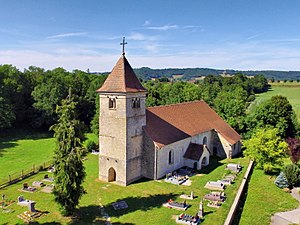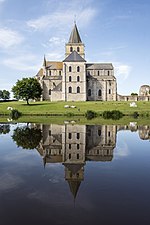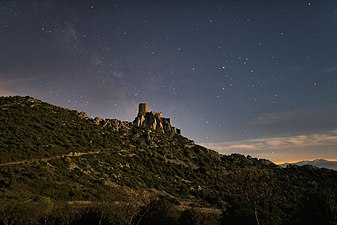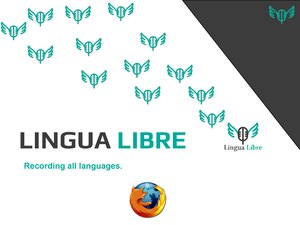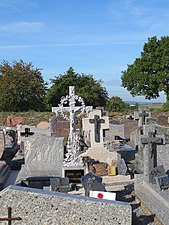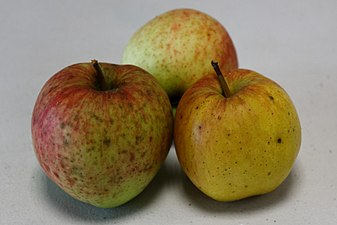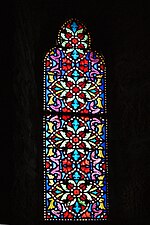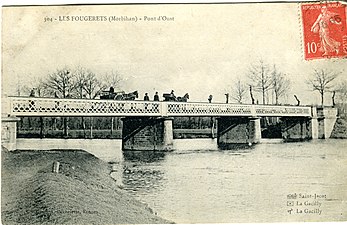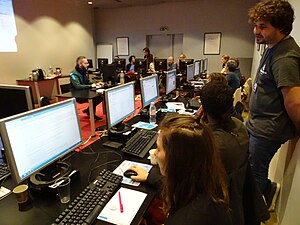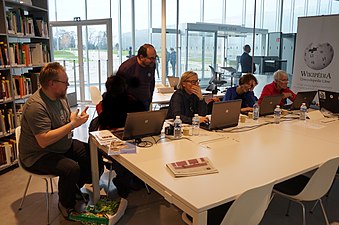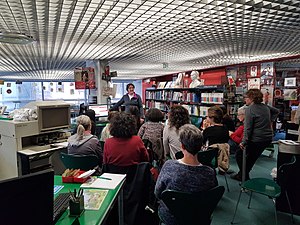Grants:APG/Proposals/2016-2017 round 2/Wikimédia France/Progress report form
Purpose of the report
[edit]This form is for organizations receiving Annual Plan Grants to report on their results to date. For progress reports, the time period for this report will the first 6 months of each grant (e.g. 1 January - 30 June of the current year). For impact reports, the time period for this report will be the full 12 months of this grant, including the period already reported on in the progress report (e.g. 1 January - 31 December of the current year). This form includes four sections, addressing global metrics, program stories, financial information, and compliance. Please contact APG/FDC staff if you have questions about this form, or concerns submitting it by the deadline. After submitting the form, organizations will also meet with APG staff to discuss their progress.
Global metrics overview - all programs
[edit]We are trying to understand the overall outcomes of the work being funded across our grantees' programs. Please use the table below to let us know how your programs contributed to the Global Metrics. We understand not all Global Metrics will be relevant for all programs, so feel free to put "0" where necessary. For each program include the following table and
- Next to each required metric, list the outcome achieved for all of your programs included in your proposal.
- Where necessary, explain the context behind your outcome.
- In addition to the Global Metrics as measures of success for your programs, there is another table format in which you may report on any OTHER relevant measures of your programs success
For more information and a sample, see Global Metrics.
The table below shows our results for all programmes. Due to the various changes experienced by Wikimedia France during these last six months we are not able to detail these results by program. This will be done for the impact report and in anticipation of the next FDC application. In fact, a broad reflection will be conducted in February with the members of the chapter to better measure the impact of our actions and to collectively draw a development strategy for the coming year.
| Metric | End of the Year Targets | Achieved outcome at half year mark | Explanation |
|---|---|---|---|
| Participants GM1 | 9965 | 1319 | This metrics includes all WLM participants, those present at the French Wikicon 2017, and participants to the Lingua Libre project. We also added people who participated in editathons since last July and people trained. The difference between the objective and the results in progress report is explained by the lack of data in two projects : Wikimooc 3 (is not begin yet) and the Wikiconcours lycéen 2017-2018 (the results will be known in June 2018)
Useful link : |
| Newly registed editors GM2 | 2720 | 178 | New contributors come mainly from editathons, we planned to achieve our targets thanks to the Wikimooc 3 and the new version of Lingua Libre |
| Articles added/improved GM3 | 16700 (and 10550 reuse on the Wikimedia projects) | 31348 (whose 29064 are images and 3729 reused (12,8%) | We have already exceeded our goals because of one main reason. We did not really planned a new edition of Wiki loves Monument in April 2017. In fact, discussions took place between members and contributors to decide if we should organize a similar edition than in the past years or start thinking on something new. Finally, at the end of August 2017, some contributors decided to support and organize WLM for 2017. The others content came from the third edition of the "Summer of Regions" campaign and from editathons.
Useful link:
|
| Press mention | 140 | abandoned | following the recommendations of the FDC this metric was abandoned |
| People trained | 4765 | abandoned | following the recommendations of the FDC this metric was abandoned |
| Volunteers hours | not planned | 3051 | |
| Partners satisfaction | not planned | / | This indicator will be in our Impact report |
Telling your program stories - all programs
[edit]Summary of the last six months inside Wikimedia France
[edit]2017 was particularly challenging because of the moral and organizational crisis that our Chapter has gone through. The crisis had significant organizational, financial and strategic consequences that had and will have a direct impact on our projects.
In terms of organization and governance, the Board was entirely renewed (except one person) by two General Meetings held at the end of 2017 (most of the former board members resigned). The two salaried directors left the Chapter —at the end of November for the Executive Director and at the end of December for the General Secretary. Due to the relative disorganization caused by the crisis and the situation discovered in September, some tasks have been delayed since July. The Board and the staff have done their best to solve the backlog and initiate a real strategic reflection. We are very pleased to see that our voluntary members are eager to participate in decision-making (by voting in large numbers at general meetings) and to take action.
On the financial point of view, the FDC allocated 50% of Wikimédia France's request. This represent a much smaller amount than in previous years. Given the very short delay and the current skills of the Chapter, we did not fully succeed to fill the gap with our own fundraising. This should result in a loss of revenue estimated at 245,000€ as of June 30 (-22%). However, we did not observe any significant decline during the fundraising campaign, or from recurring donors. In addition, the crisis caused a lot of exceptional expenditures (employee departure costs, governance audit, ...). A first quick estimate of the total costs of the crisis will be published in February.
Because of these changes, it was necessary to make some strategic choices. This is why the current 2017/2018 actions plan is very different from the initial action plan.
In terms of human resources, the staff was downsized compared to initial plans. We went from 11.5 FTE (full-time equivalents) to 8, following the departure of Nathalie Martin (Executive Director), Cyrille Bertin (Deputy ED) and Jules Xénard. Two hires are scheduled for 2018. The first will be effective from February 1st: Amélie Cabon as Fundraiser. Indeed, reducing the share of the FDC and diversifying our income sources are one of our main objectives. We have already undertaken various actions in this end:
- we accepted the proposal from the search engine Qwant to promote our fundraising campaign,
- we applied to the “Prix et Trophée de l'initiative en économie sociale de la Fondation du Crédit Coopératif”, a prize for social economy initiatives from a foundation,
- we provided expertise on knowledge management during an internal hackathon of Total.
We are still making continuous efforts in order to reach our budget goal to increase the revenues from partnerships (from 30,000 to 100,000€). The second hiring, planned for mid-2018, would be a person in charge of managing or coordinating the employees. The job description has yet to be defined. The recruitment of this person will be managed by a committee composed of different actors (Board members, volunteers, external experts). On the other hand, we had to give up the hiring of a Web developer for budgetary reasons, despite the needs expressed by our employees. Lastly, the Board decided to distribute the payroll in a less pyramidal way and is currently working on a new salary scale. Employees agreed that their remuneration would be made public.
In terms of governance, we have been keen to resume close collaboration with the Wikimedia Foundation, since communication had become difficult during the crisis. Volunteers and employees have made every effort to respect the Grant Expectations. One of our Board members has a monthly meeting with Delphine Ménard, our Annual Grant Program Officer. We look forward to attending the Wikimedia Conference through our Chair and Vice-Chair in order to participate again in international strategic thinking. We have just launched a governance audit for a budget of 24,000€ to determine the origins of the moral and organizational crisis we have gone through and identifiy our area of progress. This audit will be conducted by Associés en Gouvernance. We also resumed the certification process by IDEAS, a non-profit organization seeking to evaluate and optimize charities practices —as the certification has been suspended due to the crisis. On the other hand, the State recognition of WMFr as a public interest charity (Reconnaissance d'utilité publique), which was almost completed, is jeopardized by our budgetary precariousness. We are waiting for the results of these three processes to reform and restart our audit committee and make the necessary institutional and organizational reforms.
The Board believes that the lack of transparency is one reason for the crisis, which is why we have made many efforts in this regard. The staff has taken initiative to publish an email summarizing its current work on a weekly basis, to which the Board adds the subjects on which it works. Board's decisions and votes (except confidential decisions) will no longer be made on the Chapter's internal wiki but on Meta. In general, we strive to inform our members as quickly as possible so that they can control our action all over the year and not just at the Annual General Meeting. We also work towards making our accounts more transparent and understood by non-specialists: for the first time, annexes of the financial and tax statements (États financiers et fiscaux) were included in our 2016/2017 financial report so that to make clear the evolution of key indicators since 2012. In the next few months, we plan to improve the presentation of the Compte Emploi Ressources, which is a harmonized and simplified presentation of the accounts and a legal requirement for French organizations collecting donations.
Due to these financial, organizational and strategic factors, several projects have been either postponed of abandoned:
- Building awareness among the general public (Theme 1, Item C): the preparation of the third edition of the WikiMOOC is still ongoing. The dismissal of the employee in charge of this project caused some delay in the project prep work. However, we abandoned the idea of creating our own platform for MOOCs because,from our point of view, Wikimédia France lacks expertise to implement such a big project.
- Providing contributors with free to high-quality sources (Theme 1, Item D): the improvement of the Wikipedia Library has been postponed due to the dismissal of the employee in charge of this project, but is still important for us.
- Making the most of our volunteers (Theme 2, Item C): better welcoming new members is still a goal for the chapter but, due to the lack of financial and human resources, this project is currently postponed.
- Lobbying (Theme 3, Item C): the lack of transparency of the previous team shocked members of the Chapter. A complete redesign of this working group is needed to include more volunteers and define clear goals. The project is currently considered abandoned.
- Educational videos (Theme 3, Item D): we had to abandon this good idea developed by one of our interns due to the lack of financial and human resources.
Wikimédia France is now at a turning point. The crisis made us fear the worst, but volunteers and employees are doing their best to ensure continuity with the previous team, to inform our partners of the situation and to continue to support and implement projects. We are determined to pursue and strengthen our efforts towards the editing communities. For this, we need support from the whole movement more than ever.
THEME 1: Content development
[edit]Item A: Focusing on heritage
[edit]One of the themes generating most interest in terms of contributions is that of local and national heritage. Workshops are regularly organised in France to develop content based on a district or a town featured on Wikipedia (the Riaux/Mediathèque de Moulins editathon). The popularity of the Wiki Loves Monuments competition with French-speaking contributors was clearly demonstrated once again this year. In order to pursue the same objectives and to maintain the current level of dynamism, Wikimedia France has supported the creation of a summer photo campaign known as l'Été des régions (the Summer of the Regions) which was organised for the third time during the summer of 2017. In all, 37,000 photos have been contributed to Wikimedia Commons over the last three years. The latest campaign, which took place in a particularly difficult internal context for Wikimedia France, saw a significant fall in participation (6473 photos). However, when seeking to ensure that the French districts are better illustrated, we should also not overlook the unequal quality of the content concerning them. An additional project was therefore launched in 2016. Based on the realisation that articles on the French districts often all follow a pre-established plan, and that this concerns an extensive corpus of articles (as France has more than 35,000 districts and more than 40,000 if we include potential articles on former districts), we therefore concluded that it should be possible to create a tool, known as Ma Commune Wikipédia (My Wikipedia District), making it possible to identify areas for improvement concerning these articles (through a comparison between districts of similar size), and to present an overview of the areas for improvement and the districts requiring the most work. Following the publication of an initial prototype in May 2016, a full redesign was undertaken from June 2017 onwards and the application was published on July 24 on https://macommune.wikipedia.fr. The 2017 Wiki Loves Monuments campaign demonstrated just how popular this theme is for the French-speaking community.

Origins and description of the initiative
[edit]There are many historical monuments in all countries. The objective of the Wiki Loves Monuments project is to encourage everyone to take photos of these monuments and to make them available under free license to enable as many people as possible to access them. With this in mind, an international competition is held each year during September and Wikimedia France has participated in this since 2011. This competition provides a means for the association to make the French people more aware of their own heritage, to forge closer links with them and to get Wikimedia projects better-known by the general public. Since the second international event in 2011, the French Wiki Loves Monuments event has made it possible to bring together 118,372 photos online, imported by 4,378 different people. Each year, the volunteers from Wikimedia France and its partners commit more than 450 hours of their time to sorting the photos, selecting the winning entries and helping with the organisation. Unfortunately, the number of contributions and participants has tailed off since 2012. The number of submissions even dropped below 10,000 photos uploaded in 2016. The volunteers from the organisational committee and more generally the association’s members have seriously questioned the value of repeating the competition. More than 76% of French historical monuments are already covered and it’s becoming increasingly difficult to illustrate the remaining monuments or to continue getting volunteers involved in this project. After lengthy discussions with the members of the working group and the community, it was finally decided to continue organising the competition, which, with 178 new accounts created in 2016, remains one of the association’s most effective activities (just behind the WikiMooc). In the particularly difficult context experienced by the association since the summer of 2017 when very few contributors wished to get involved with Wikimedia France’s activities, the launch of the competition almost didn’t get underway. In August, it was therefore a small team of around 10 volunteers who began organising the sixth Wiki Loves Monuments France event. After a fairly busy month in the association in September with the organisation of the special general meeting, the volunteers were more engaged than ever. Unlike previous years, the number of imported photos and participants was up. For this 2017 event, five panel members, (amateur or professional photographers and contributors to Wikimedia projects) were involved in three selection phases to choose from the 9,499 competing images submitted. Ten of them, listed in order of preference, were chosen, giving the authors recognition for their volunteer work and their talent. Each of them was awarded a prize, in addition to an art print of their picture for the first three, which took place in the Wikimedia France offices in Paris on December 2, 2017.
Results obtained
[edit]The Wiki Loves Monuments competition therefore went ahead in September and more images were published online than in previous years: 12,305 photos uploaded of which 9,513 were eligible for the competition (8,441 in 2016). Among all of the images submitted, 2,054 were reused for the various projects. The number of participants was also up: 360 (compared to 303 last year). Additionally, one of the prize-winning French photographs was included in the top 25 for the international Wiki Loves Monuments competition.
Next steps
[edit]A working meeting concerning the Wiki Loves Monuments competition is already scheduled for the weekend of March 31 to April 1 to work on the next event and to improve the organisation of this event. Better documentation is required to ensure that someone who is completely unaware of the project could take part, whether as an organiser, jury member or contributor. The “Ma Commune Wikipédia” platform (My Wikipedia District) was favourably received. We now need to get it more widely known. In addition to the contributors to the Communes de France (Districts of France) project, the tool could be useful during the contribution workshops held in the regions. A great deal of work focusing on heritage is currently being planned. After three summer photography campaigns, l’Été des régions (the Summer of the Regions) should be merged with Ma Commune Wikipedia, which should become the go-to tool for working on content improvement related to the local authorities. A partnership with Open Data France in addition to more active support for Open Content campaigns are two means being envisaged to circulate this tool and to improve its use.
-
Brémondans, l'église de Leugney
-
Castle of Peyrusse-le-Roc
-
CerisyAbbaye
-
Chapelle de la Vieille Charité Marseille 2017
-
DR-DomFelga-012
-
MK54063 Maison Carrée (Nîmes)
-
Nantes (44) Basilique Saint-Nicolas 08
-
Quéribus sous la Voie lactée
-
Village martyr d'Oradour-sur-Glane 10
-
Vue de la façade du château du Rivau depuis le conservatoire des légumes
Item B: Activities involving schools and universities
[edit]
The chapter’s activities in the educational and teaching fields include teaching people about the media and the provision of information aimed at helping people develop a critical state of mind and encouraging teamwork among pupils and students. To achieve this, we regularly provide “training for trainers” at various levels (teachers and teacher-documentalists) enabling them to carry out educational projects within an establishment. They can also have their project included within a reference framework for several months via the Wikiconcours lycéen, a competition which is aimed at high schools. Regularly updated resources are made available to everyone, including among others the educational kit launched in September 2015. The association has also been officially recognised since 2014 by the Ministry of National Education as an educational association complementary to public education.
We would like to make the association a key player in the fields of media education and information. Via the educational kit, the partnership with the Ministry of National Education, the Wikiconcours lycéen (high school wiki competition), our presence at leading shows and the support for people putting forward projects, we are seeking to raise awareness among target groups within the educational system. It is vital to be able to respond to ministerial priorities by supporting teachers with outstanding projects. As an example, we’re thinking of an eighth-grade teacher (fourth and fifth year of primary school) who, following a meeting with Wikimedia France during a training session in 2014, and with the help of other teachers, encouraged primary school pupils to contribute to articles concerning their home villages and départements (counties). This firstly resulted in the drafting of an outline Wikipedia page accompanied by a letter written by the pupils to the village mayor with a request to wave image rights. We are very proud of this type of project which, three years later, has become a departmental project (Orléans-Tours local education authority). It should be noted that the person proposing this project Cdupuy5 was invited to take part in the 2016 French language Wikiconvention during the roundtable session focusing on Wikimedia classroom projects. A video summarising the launch of this project can be viewed (in French) on Dailymotion: https://www.dailymotion.com/video/x2b0f2e

Origin and description of the educational activities
[edit]Over the last six months, we have consequently trained teachers in the use of Wikimedia projects in the classroom and in contribution, as part of the training sessions provided ahead of the Wikiconcours lycéen (high school Wikicompetition). The latest version of this competition was organised once again with the Ministry of National Education (CLEMI/CANOPE) in late November 2017. Teachers and teacher-documentalists were also supported in their efforts to introduce Wikimedia-based educational projects. Doctoral students from the Collège Doctoral de Lille (Lille Doctoral School) were recently trained in contributing to Wikipedia as part of an educational module entitled Valoriser ses connaissances avec Wikipédia, (Showcasing your knowledge with Wikipedia). After being trained for a total of six hours, they have two months to contribute to a subject of their choice, generally related to their thesis work. The association was also present at the Educatec show, which is held once a year in Paris, enabling us to achieve greater visibility and to boost our reputation in the digital education field. This was also an opportunity to meet people with projects combining Wikipedia and digital technology, and to provide them with the support they need. Finally, concerning the Wikiconcours lycéen (high school Wikicompetition), the organisational team has been joined by two teachers who are contributors to Wikipedia. Thanks to their dual role, they possess extensive technical knowledge of the tool and also of the educational aspects. We are delighted that they were prepared to participate once again in organising and monitoring the competition.
Results obtained
[edit]- 200 people came to see us during the Educatec show;
- 14 education authorities in metropolitan France, in addition to the education authority for Guadeloupe and Réunion, accounting for just under 35 education establishments, are participating in this new Wikiconcours lycéen (high school Wikicompetition);
- 16 doctoral students were trained and have created and/or modified 24 articles.
Next steps
[edit]More training sessions in the use of Wikimedia projects in the classroom and in contributing are already scheduled for the next six months, particularly in March when several are planned. It should be noted that this year at least two sessions have been arranged in teacher training centres (this was an objective for us). The classes taking part in the Wikiconcours lycéen have until May to contribute. Between now and then, we will be on hand to support the teachers, professors and documentalists with their educational projects or even to get involved in the classroom if necessary. Following the success of the training provided for doctoral students in Lille, a further three sessions are planned this year (compared to 2 in previous years) to ensure that there is no longer a waiting list and to enable all doctoral students to take part. A project to provide the basic information from the existing educational kits but above all feedback by video from educational project initiators will be launched and later consolidated over the coming months: we are still meeting too many teachers who could not have imagined that it would be possible for their colleagues to launch such projects and/or who feel that this is not compatible with classroom work. We plan to include input from these project initiators in short clips (which can easily be shared).
Item C: Languages
[edit]Over the last few years, Wikimedia France has developed several activities aimed at supporting contributors to Wikimedia projects in regional and minority languages, with an initial contribution day focusing on Occitan and workshops in Alsatian. The work carried out with local associations has made it possible to create a network of trusted partners. The cooperation launched with the University of Strasbourg and the Centre National de la Recherche Scientifique (National Centre for Scientific Research - CNRS) last year has given rise to a more extensive initiative to open up their collections of audio material.

Description of the initiative
[edit]Our activities in this field will be continuing during the second-half of the year with high expectations for the joint initiative organised by Signes de Sens, (an association specialising in providing online access to content for persons who are hard of hearing) and Wikimedia France. These project, which was launched at the initiative of the Signes de Sens association, is designed to circulate videos in French sign language on Wikimedia Commons under free license with the ambitious aim of making Wikipedia more accessible to deaf people. Launched last September, several preparatory meetings have been arranged and a partnership agreement has been signed between both organisations to meet this objective. Since then, a group of French-speaking contributors keen to work on this project has been set up and has given thought to the best way to incorporate videos in French sign language on Wikipedia and in the other Wikimedia projects. The French sign language project will involve a significant amount of our resources but the expected results could radically change access to Wikipedia and could form the basis for other similar projects. However, since one year, Wikimedia France activities on this topic were deeply focused on supporting the development of the Lingua Libre project. During the last six months the Lingua Libre project has become particularly important, with the organisation of development meetings, workshops, demonstrations and presentations in addition to the adaptation of the tool for scientific investigations. Henceforth, as Wikimedia France does not have the capacity to maintain and continue the development of the Lingua Libre tool which many communities of contributors are expecting from us, we have supported the Project Grant application submitted by 0x010C. With almost 10,610 recordings and around 30 languages, we are very proud to note people’s high expectations for this new tool and will assist the team working to integrate Lingua Libre within the Wikimedia project ecosystem as best we can. Lingua Libre was presented during the latest events run by the Wikimedia movement such as the Vienna Hackathon, Wikimania, WikiCon 2017 and naturally the French language Wikiconvention. The demonstration given at the last Wikimania in Montreal marked the start of a series of recordings in Atikamekw, one of Canada’s native languages, as part of the project run by Wikimedia Canada. These recordings are today available on Wikimedia Commons.
Results obtained
[edit]- 10,610 recordings (Lingua Libre)
- 120 participants
- A team of 10 contributors
- 15 partners (institutions and associations)
Next steps
[edit]Lingua Libre will continue to grow thanks to the outstanding work of the contributors involved since the start of this project and to 0x010c’s expertise. Wikimedia France will continue to be involved in order to provide a general framework for meetings, experimentation and the network of partners needed to ensure the success of this project. Support for the linguistic communities will need to increase over the coming months, particularly by identifying and precisely analysing the needs of our contributors and then putting in place a clear framework for actions designed to support them.
-
2017 Wikimania, LinguaLibre presentation
-
Lingua Libre workshop (PCI Lab)
-
LinguaLibreAtikamkew1
-
Lingua Libre Presentation, WikiConventionFr 2017
THEME 2: Working with the Communities
[edit]Item A: Supporting the Francophone community
[edit]After the first French language Wikiconvention in 2016, we have continued to encourage better cooperation between those parts of the Wikimedia movement which support contributions in the French language. Closer cooperation has been organised with Wikimedia CH, Wikimedia Canada, the Tunisia Usergroup, and the Ivory Coast and Cameroon Usergroup within Wikifranca. We are trying to plan the association’s activities more effectively when these can have an impact on a wider French language project as part of the Wikimedia ecosystem. We are already involved in organising the 2018 “French language contribution month” which will start next March. Similarly, initiatives aimed at organising simultaneous themed editing days in different countries are being prepared, particularly during international days, including for example contribution workshops focusing on the gender gap during women’s day. The 2017 French language Wikiconvention held from October 19-21, 2017 in Strasbourg is a perfect illustration of the work undertaken to encourage closer co-operation.

Origins and description of the 2017 French language Wikiconvention
[edit]Based on the positive feedback received from the community after the first event, Wikimedia France has supported the organisation of a new event with the aim of ensuring the long-term future of this annual gathering of the French-speaking community. All of the partners from the first Wikiconvention with the exception of the l'Oréal foundation, who we did not approach, have once again agreed to support the organisation of this event in Strasbourg. The French Ministry of Culture, operating via the Délégation Générale à la Langue Française et aux Langues de France (DGLFLF – Department for the French language and the languages of France), has enabled us to offer 10 grants covering transport costs for contributors living in Europe. Just like last year, a subsidy from the International Organisation of La Francophonie (Organisation Internationale de la Francophonie - OIF) has facilitated the complete coverage of costs for contributors coming from African countries (visa costs, flights, accommodation and meals). However, as in 2016, several contributors have had their visa applications refused by the French authorities. An analysis of these refusals needs to be carried out before the next event to enable more people to participate fairly in this wonderful moment of togetherness and community spirit. We noted two key changes in the organisation of this 2017 Wikiconvention:
- Greater involvement by contributors
This year, an organisational committee comprised of Wikimedians made up of contributors representing the French language countries was set up. Among other things, this committee had the task of selecting the recipients of a grant from the International Organisation of La Francophonie. It also acted as an interface by informing the community of the event and was involved in designing the event programme. The Wikimedians from Alsace and Strasbourg were also actively involved in the organisation of the Wikiconvention by assisting with local logistics or meeting the event’s partners. Among other things they planned the accompanying events such as the “Festicabale” social evening, the contribution day at the André Malraux media library and a chance to discover Strasbourg’s old town by canoe.
- The local impact
For the first time ever, local stakeholders were involved in the preparations right from the outset. Firstly, the Office pour la Langue et la Culture d'Alsace et de Moselle (OLCA – Office for the Language and Culture of Alsace and Moselle), with whom Wikimedia France was already working closely to support contributions in the Alsatian language, operated as an intermediary with the Grand-Est Region. Thanks to this partnership, the president of the Grand-Est region allowed the Wikimedians to use the regional council’s premises free of charge for the organisation of the event. This involvement by the region also encouraged the City of Strasbourg to take part, acting via its deputy mayor with responsibility for digital affairs. Strasbourg City Hall welcomed the Wikimedians during the evening in its premises, firstly for a welcome reception but also by providing a conference room in the town centre for a meeting between Katherine Maher and the president of the education and culture committee of the National Assembly (the French parliament). This help from the local authority will lead to the emergence of new projects by putting the community in touch with local public authorities who are now more aware of our activities.
Results obtained:
[edit]- 120 participants
- from 10 different countries
- 40% women
- 20 grant-holders
- 81% satisfaction
- 43 speakers
The number of participants was slightly lower than for the first event. This difference is explained by the organisation date for the Wikiconvention, which was later in the year (October) and outside the school holiday period. Additionally, the conferences ran from the Thursday to the Saturday due to the opening hours of the public building hosting the event. For the next event, we will therefore organise it earlier in the year and organise it over a whole weekend once again.
Next steps
[edit]From January 2018 onwards, we will begin preparations for the next event, which should be held in summer 2018. An organisational committee will be set up once again with greater participation by the chapters and User groups. For the third time running, the French language Wikiconvention will be held in France and we really want to take advantage of this event to do the groundwork for hosting it in another French-speaking country from 2019 onwards. A great deal of upstream work will be required to facilitate coordination for this next step.
-
Wikiconvention's canoe ride
-
Group photo
-
Visit of Strasbourg
-
Edit-a-thon day
Item B: Local groups
[edit]The situation with local groups in January 2018
[edit]Late 2017 saw a high level of involvement by local contributors’ groups in the internal crisis underway in Wikimedia France. Local leaders adopted a collective position which was opposed to the choices of Wikimedia France’s Board and the Management of Wikimedia France. Although this situation resulted in a certain degree of paralysis in local Wikimedia activities, it also showed the limitations of the regional development strategy as originally designed. Discussions have been initiated with contributors to come up with a new organisational structure as quickly as possible enabling Wikimedia France to more fairly and more effectively fulfil its role when it comes to supporting the community. With this in mind, we have taken part in several discussions and exchanges of experience with other chapters to draw inspiration from the methods used elsewhere (Volunteer support meeting 2017, Wikicon 2017).
However, despite these special circumstances, Wikimedia France has continued to support the projects carried out by the community. Monthly helpdesk/drop-in sessions have continued to be held in Bordeaux, Montpellier and Paris. Twelve micro grants were allocated by the Micro-financing committee, whose role and budget should increase over the coming months. Furthermore, Wikimedia France continues to work closely with other associations working on themes which are similar to ours. Consequently, last October the association supported the organisation of Open Content campaigns aimed at collecting and circulating data from local authorities.

Origins and description of the initiative
[edit]An Open Content campaign is an initiative aimed at opening up and circulating a local authority’s content, spanning a 48-hour period. Often organised at the initiative of, and in collaboration with the local authority concerned, the photos and the Wikipedia pages concerning the area are all updated and improved during these events. The Open Content Campaign of October 8 and 9, 2017, concerned the districts of Peillac and Les Fougerêts in Brittany. Wikimedia France was involved to support the organisation of the event and the participating contributors.
Results obtained:
[edit]- 265 photos uploaded to Commons
- 15 participants
- 63 files reused for other Wikimedia projects
- 141 modifications (+ 50,000 bytes) to the Wikipedia pages for both districts, by 24 different editors
Useful links
[edit]Next steps
[edit]To facilitate support for contributors’ activities and to achieve greater transparency, we intend to review the way the Wikimedians’ projects are financed, particularly by expanding the micro-finance committee. As a reminder, this committee is comprised of members of Wikimedia France who vote to allocate funds to contributors (the purchasing of sources to write articles, reimbursement of transport costs to take part in a workshop or a Wikimedia event, etc.).
-
Cemetery les Fougerêts
-
Coeur de boeuf (Apple) - OPL Peillac
-
Les Fougerêts - Church
-
Bridge in Peillac
-
old post card of Peillac
THEME 3: Promoting and Protecting Projects
[edit]Item A: Training target audiences (schools, volunteers and professionals)
[edit]The association is regularly asked to organise training in contributing to Wikimedia projects (mainly Wikipedia, Wikidata and Wikimedia Commons). The audiences are diverse and usually depend on the theme and the context concerned. The training sessions can be organised at the initiative of a partner or of the association in order to train contributors to future Edit-a-thons or volunteers from the association keen to improve their skills.

Origins and description of the training sessions
[edit]Training courses are mainly organised with the aim of ensuring greater autonomy for the various participants including volunteers, partners and target audiences. They may concern the training of volunteers in the creation of a project in relation to the association, the organisation of a contribution day but also the training of contributors who will then go on to train other people. The partners always receive support and training during their first project for the association, to help them carry out their contribution work in a more independent manner. The association acts as a facilitator between the various stakeholders: the partners and the community, in addition to new and experienced volunteers. Contributors who have recently joined projects regularly contact the association to improve their skills in certain subjects. In most cases, we refer them to the local group nearest them or invite them to take part in a Wikimedia activity which has already been scheduled, in order to receive training in line with their request and also to meet people in their area. Over the last six months, we have seen an increase in the number of requests received.
Results obtained
[edit]It has been possible to train around 100 participants over the last six months including volunteers, teachers, teacher-documentalists, doctoral students or contributors during the contribution days (librarians, researchers, museum staff, etc.).
Next steps
[edit]A number of tools and resources already make it possible for target audiences to improve their skills with Wikimedia projects (the educational kit and brochures for audiences from within the educational system, in addition to the WikiMOOC and its videos, which are available online for the general public). However, we also plan to introduce a training module for volunteers. We have already mentioned a ‘training for trainers’ module but during the training sessions we also noticed a number of gaps still to be covered concerning the way the association operates, the possibilities to finance a project, the various ways of receiving support from the association or the international aspects. Although contribution to Wikimedia projects appears essential, we feel that it is vital to understand the challenges and the context of the association, the way it works and above all the ways it can be supported as a volunteer when implementing your project.
Item B: Open Content
[edit]In this area in particular, we have taken into account the staff proposal assessment observations in response to our last proposal. Consequently, and to follow on from the reorganisation of our chapter, the first six months were dedicated to redesign our open content programs and GLAM strategy. We needed to analyse the context, make a real assessment, clear targets, define new objectives, and create a link between the rationale behind our decisions and the potential results. The following description try to give more substantial details about this project.

Origins and description of the initiative
[edit]Over recent months we have given thought to the dynamics and the strategic direction of our partnership projects, and have realised that most activities are based on replicable models, which do not make it possible to guarantee their long-term future or to include them as part of a dynamic open data process. The Edit-a-thons for example provide an excellent solution when it comes to extending the network of partnerships and developing content but only provide a starting point from which a long-term partnership can be envisaged. Additionally, despite the high level of involvement by volunteers we have identified the need to find tools and resources to encourage the autonomy of our partners with the aim of creating a solid and long-term link between these GLAM institutions and Wikimedia projects. The aim is to avoid an imbalance between the number of actions to be carried out and the resources available within the community. Finally, the economic model of French cultural organisations further limits the scope of the actions and the stability of the relationships we are seeking to develop with them. Although a trend towards openness is taking shape through the open data initiatives encouraged by the government, our contacts seeking to implement such projects often find themselves isolated in relation to their colleagues, managers, or even as a result of constraints imposed by the Réunion des Musées Nationaux (RMN – national museums’ association), further increasing the fragility of our partnerships. The association therefore has a key role to play in the organisation, promotion and support for “open content” initiatives in France which are still in their infancy. Over the last few weeks, we have clearly identified our priorities and are benefiting from the renewed dynamism resulting from the recent restructuring undertaken within the association. The arrival of a civic service volunteer devoted to the GLAM project on November 27, 2017, has enabled us to draw up an initial assessment of our activities and partnerships, allowing us to more precisely analyse the project’s characteristics and to draw up an overview which confirmed our strategic goals from the last few months. We firstly noted a lack or even a complete absence of follow-up for certain actions. This initially allowed us to distinguish between actions related to GLAM cultural institutions and specific actions carried out as part of a GLAM project. Some of these were also part of other projects such as the Les sans PagEs project. It is therefore understandable that most of the actions carried out are not being repeated. But looking beyond these specific characteristics, the different transition periods within the association have not enabled us to put together a genuine strategy and have led to the current situation in which we are simply tackling matters as they come. The project was consequently suffering from a lack of perspective. These shortcomings were also felt by the participants in the actions organised, who, based on the feedback, were unclear of the exact goal they were working towards or of the joint project they were involved in. Next, the activities which attracted most people and which generated the most benefit from both a quantitative and qualitative viewpoint were those related to political issues or topics seen as important by the general public (including Art + feminism to mention just one). For their part, the other successful activities emerged as a result of efforts by local groups working in direct liaison with documentalists, guaranteeing continuity, follow-up and the showcasing of the finished work (such work also benefited from higher reuse rates). The objectives for the year are therefore to encourage autonomy for our partners, to introduce communication, analysis and strategy tools and to unite our partners around a network sharing a common wish to see open data and content. To do so, we are working on the introduction of a clear strategy and the definition of a GLAM partnership model which can be reasonably deployed and adapted in a manner which takes account of the specific characteristics of each institution. We are also working to ensure uniformity in the way projects are managed, the introduction of success and failure criteria and a standardised feedback system to ensure improved use of results.
Results obtained
[edit]Over the last six months, the association has supported 22 edit-a-thons throughout France, which have been held in museums, documentation centres, libraries and media libraries, etc.:
- A Women and Feminism workshop in Nantes: https://fr.wikipedia.org/wiki/Projet:Ateliers_Femmes_et_F%C3%A9minisme_(Nantes)
- Edit-a-thons as part of the libraries’ festival in Paris: https://fr.wikipedia.org/wiki/Projet:Edit-a-thons_Festival_NUMOK_2017
- Edit-a-thon at the Louvre Museum in Lens: https://fr.wikipedia.org/wiki/Projet:Journ%C3%A9e_contributive_Louvre-Lens
- Women and Feminism edit-a-thon in the Hérault region, in Montpellier: https://fr.wikipedia.org/wiki/Projet:Femmes_et_f%C3%A9minisme_dans_l%27H%C3%A9rault
- Edit-a-thon at the Saint-Brieuc Museum: https://fr.wikipedia.org/wiki/Wikip%C3%A9dia:Rencontres/Ouest#Edit-a-thon_au_mus.C3.A9e_de_Saint-Brieuc
- Edit-a-thon at the National Art History Institute in Paris: https://fr.wikipedia.org/wiki/Projet:MagnaGreciaOpenData
- Edit-a-thon au Musée Départemental Arles Antique in Arles: https://fr.wikipedia.org/wiki/Projet:Barriol_dans_l%27oeil_de_Wikip%C3%A9dia
- Edit-a-thon at the Ministry of culture and communication in Paris: https://fr.wikipedia.org/wiki/Projet:Edit-a-thon_PciLab
- Art+Feminism edit-a-thon at the Gaité Lyrique cultural centre in Paris: https://fr.wikipedia.org/wiki/Projet:Art%2BF%C3%A9minisme/30_septembre_2017
In addition to these events, an edit-a-thon was held in partnership with the Ministry of the environment in Paris on the theme of the objectives of sustainable development. In all, 186 participants created and/or improved 465 Wikipedia articles.
Next steps
[edit]It will probably be necessary to reduce the number of actions in order to focus our energy on the most promising long-term projects, targeting partners who are not simply followers where open data is concerned. This may involve focusing our work on our partners’ documentalist staff. We have also injected fresh dynamism into the GLAM group, which has a salaried representative and one from the voluntary community. Meetings are regularly organised to ensure the continuity of our project. We can draw upon our experience from the partnerships underway with the National archives and Lille Fine Art Museum, which could become genuine powerhouses for the creation of a cohesive network to be officially launched at the end of the year during an event bringing together the various organisations with which we work.
-
Edit-a-thon at the Ministry of culture and communication in Paris
-
Edit-a-thon at the Louvre Museum in Lens
-
Les sans pagEs edit-a-thon at the "Bibliothèque Marguerite Durand"
-
Women and Feminism workshop in Nantes
Revenues received during this period (6 month for progress report, 12 months for impact report)
[edit]Please use the exchange rate in your APG proposal. 1 € = 1.0907 $
Table 2 Please report all spending in the currency of your grant unless US$ is requested.
- Please also include any in-kind contributions or resources that you have received in this revenues table. This might include donated office space, services, prizes, food, etc. If you are to provide a monetary equivalent (e.g. $500 for food from Organization X for service Y), please include it in this table. Otherwise, please highlight the contribution, as well as the name of the partner, in the notes section.
Revenue source Currency Anticipated Q1 Q2 Q3 Q4 Cumulative Anticipated ($US)* Cumulative ($US)* Explanation of variances from plan Memberships fees € 8,500 - 112 - - 112 10,581 139 Many members pay more than the amount of membership. Although we have a constant number of members, the overall amount of membership is difficult to assess. APG € 343,000 - 200,083 - - 200,083 427,013 246,089 Donations € 364,000 23,650 215,616 - - 239,266 453,227 297,917 Projects Grants € 100,000 - 31,653 - - 31,653 124,465 39,396 Including Sponsorship, Call for project and Charity products. Miscellaneous revenus € 2,000 1,046 - - - 1,046 2,488 1,301 Other incomes € 22,760 - 1 - - 1 28,314 1 Included in Grants. Assumption of liability € 12,784 12,784 - - - 12,784 15,904 15,904 - Costs transfer € 3,705 8,938 3,866 - - 12,804 4,609 15,928 TOTAL € 856,749 46,419 451,330 - - 497,749 1,065,687 619,265
* Provide estimates in US Dollars
Spending during this period (6 month for progress report, 12 months for impact report)
[edit]Please use the exchange rate in your APG proposal.
Table 3 Please report all spending in the currency of your grant unless US$ is requested.
- (The "budgeted" amount is the total planned for the year as submitted in your proposal form or your revised plan, and the "cumulative" column refers to the total spent to date this year. The "percentage spent to date" is the ratio of the cumulative amount spent over the budgeted amount.)
Expense Currency Budgeted Q1 Q2 Q3 Q4 Cumulative Budgeted ($US)* Cumulative ($US)* Percentage spent to date Explanation of variances from plan Thème 1: Content development € 165,730 35,515 47,420 82,935 205,871 103,109 50% - Thème 2- WORKING WITH COMMUNITIES € 224,694 65,886 74,851 - - 140,737 279,334 174,984 63% - THEME 3 - PROMOTING AND PROTECTING PROJECTS € 167,196 55,877 47,252 - - 103,129 207,885 128,226 62% - THEME 4 - FUNDRAISING € 42,115 12,669 16,789 - - 29,457 52,351 36,611 70% - THEME 5 - OVERHEAD COST € 375,998 83,927 277,825 - - 361,752 467,358 449,650 96% - TOTAL € 975,732 253,873 464,137 - - 718,010 1,212,951 892,572 74% N/A
* Provide estimates in US Dollars
Compliance
[edit]Is your organization compliant with the terms outlined in the grant agreement?
[edit]As required in the grant agreement, please report any deviations from your grant proposal here. Note that, among other things, any changes must be consistent with our WMF mission, must be for charitable purposes as defined in the grant agreement, and must otherwise comply with the grant agreement.
- See above in Summary of the last six months inside Wikimedia France.
Are you in compliance with all applicable laws and regulations as outlined in the grant agreement? Please answer "Yes" or "No".
- Yes.
Are you in compliance with provisions of the United States Internal Revenue Code (“Code”), and with relevant tax laws and regulations restricting the use of the Grant funds as outlined in the grant agreement? Please answer "Yes" or "No".
- Yes.
Signature
[edit]- Once complete, please sign below with the usual four tildes.
Resources
[edit]Resources to plan for measurement
[edit]- Global metrics are an important starting point for grantees when it comes to measuring programmatic impact (Learning Patterns and Tutorial) but don’t stop there.
- Logic Models provide a framework for mapping your pathway to impact through the cause and effect chain from inputs to outputs to outcomes. Develop a logic model to map out your theory of change and determine the metrics and measures for your programs.
- Importantly, both qualitative and quantitative measures are important so consider both as you determine measures for your evaluation and be sure to ask the right questions to be sure to capture your program stories.
Resources for storytelling
[edit]- WMF storytelling series and toolkit (DRAFT)
- Online workshop on Storytelling. By Frameworks institute
- The origin of storytelling
- Story frames, with a focus on news-worthiness.
- Reading guide: Storytelling and Social change. By Working Narratives
- The uses of the story.
- Case studies.
- Blog: 3 Tips on telling stories that move people to action. By Paul VanDeCarr (Working Narratives), on Philanthropy.com
- Building bridges using narrative techniques. By Sparknow.net
- Differences between a report and a story
- Question guides and exercises.
- Guide: Tools for Knowledge and Learning. By Overseas Development Institute (UK).
- Developing a strategy
- Collaboration mechanisms
- Knowledge sharing and learning
- Capturing and storing knowledge.

